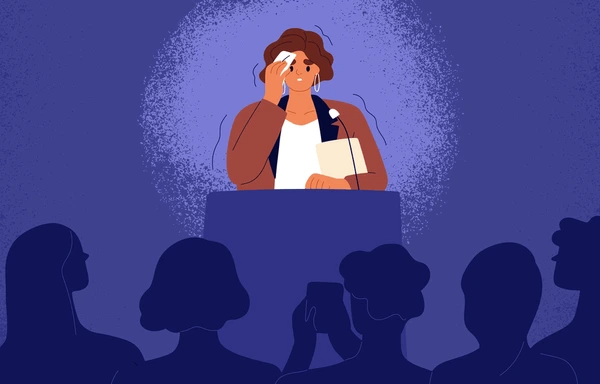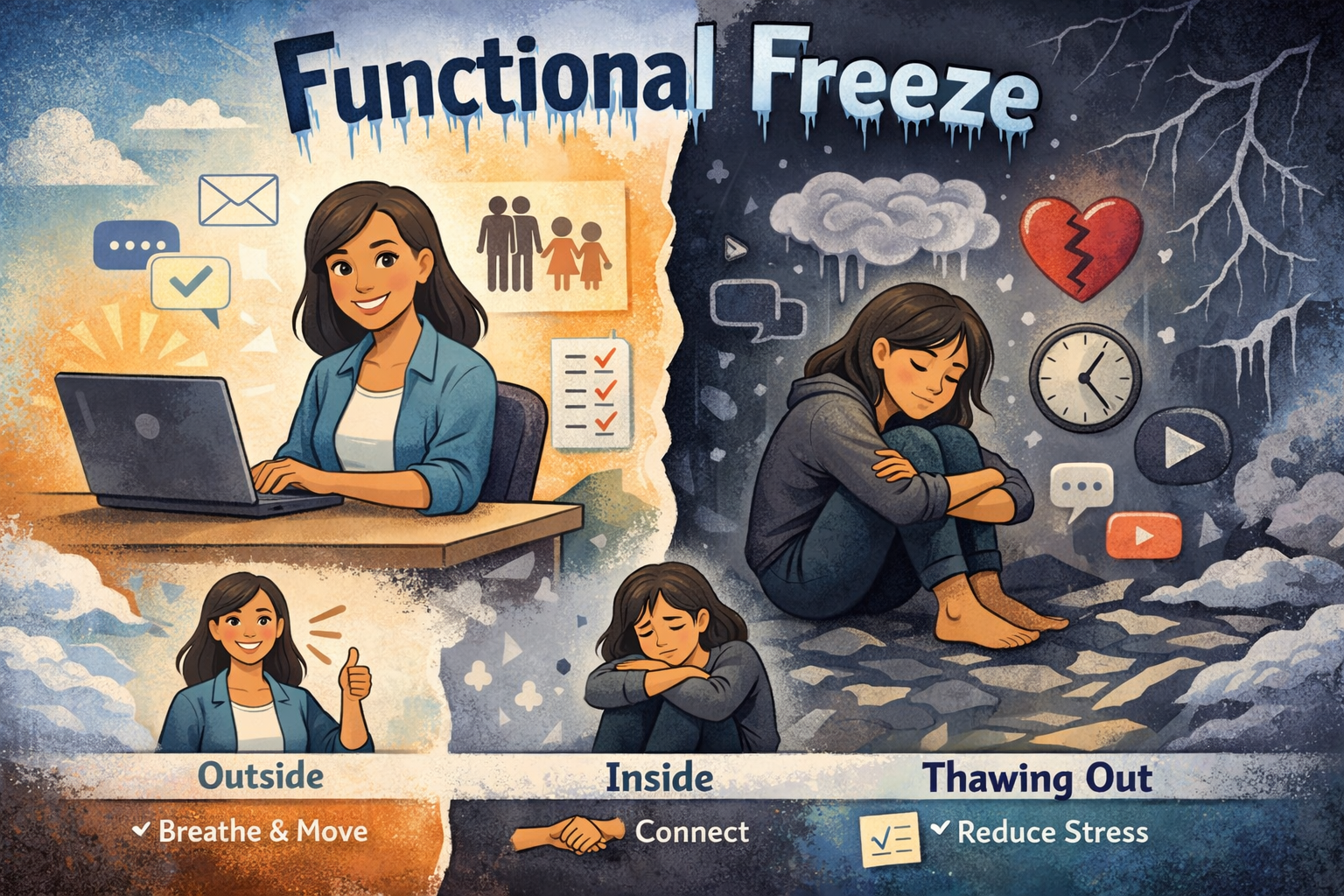We understand that public speaking is among the most common trigger point for anxiety which we experience. It is quite alarming to think of a situation, where we are faced with a large audience staring at you. It can be even frightening for many. We may get become wordless, get nervous, our hands sweat, and heart beat rises. For many, past experiences may reinforce this anxiousness, making it even harder to speak confidently in public.
However, there is good news. We need not be afraid of such situations. We can master the skill to overcome fear associated with public speaking. With the right approach and mind set, anyone can learn to become a confident speaker. Anyone can develop into a confident speaker with the correct mind therapy methods and attitude.
Why Is Public Speaking a Fear for Us?
Glossophobia, commonly known as the fear of public speaking, is a result of our ancient survival drive. For protection, our predecessors depended on social acceptance. It was risky to stand in front of a crowd since rejection could result in isolation and rejection. Even today, the fear of being judged, committing mistakes, or experiencing embarrassment triggers the same kind of reaction.
Common Signs of Public Speaking Anxiety
- Nervousness before and during speaking
- Sweaty palms and shaky hands
- Increased heartbeat and shortness of breath
- Forgetting while speaking
- Avoiding opportunities to speak before the public
These signs are very common among us. You may be surprised to know that a 2014 National Institute of Mental Health study found that over 75% of people are afraid of public speaking. It means the majority of us are not confident enough to speak in front of large gatherings.
Take a Free Test to Discover Your Anxiety Level !!
The Benefits of Practice
"The only way to overcome fear is to face it head-on." Dale Carnegie famously said this. Public speaking gets better and better as we practice more, just like any other ability. It becomes less intimidating as we do more. Begin modestly by speaking in front of a friend, recording yourself, or practicing in front of a mirror. Then we should move gradually to larger gatherings.
I can clearly recall my very first college speech. I still remember the nervousness I experienced; I could not speak for a few minutes. It was the anxiety that was playing behind the scenes. It was literally a frightening experience. However, I eventually got better at speaking up in a tiny group. Gradually, things started improving with time. After about a year, I felt at ease speaking in front of my class.
For students, academic pressures, social expectations, and public speaking anxiety often go hand in hand. If you’re struggling with stress and self-doubt, check out Managing College Student’s Stress and Anxiety for expert strategies to build confidence and resilience.
Ways to Get Rid of Our Fear of Public Speaking
1. Get ready well in advance
a) Be Prepared
Being prepared gives us confidence. Understand the subject thoroughly. Prepare handwritten notes. Instead of learning everything by heart, write down the important ideas. We will feel in charge when you grasp the content. Being thorough with the subject matters.
Preparing thoroughly:
- Clearly define the introduction, body, and conclusion of the speech.
- To sound natural, use brief points (short sentences) rather than lengthy sentences.
- Foresee potential queries and prepare responses.
b) Pay attention to the content, not yourself
We mostly worry about our appearance or whether we will be able to speak. Better we focus on the content and what the audience is going to learn from the speech. Once we shift our focus, pressure to perform will ease.
c) Regulate the breathing
We tend to breathe more quickly when we are anxious. This may exacerbate anxiety. Breathe deeply and slowly before we speak. The 4-7-8 method is a basic technique and getting popular across the world. This technique helps calm the nervous system and reduce anxiety. Guided breathing exercises, as practiced in Sakoon Wellness Retreats, can be incredibly effective in managing stress and achieving mental clarity.
4-7-8 Method:
- Take a 4-second breath.
- Wait 7 seconds.
- Take an 8-second breath out. This stabilizes our voice and soothes our nervous system.
d) The use of positive visualization
Imagine giving a speech that ends with the audience nodding and smiling. We can program our minds for confident public speaking by using visualization. We just have to imagine that way. Once we do it, our unconscious mind will start programming in that way.
Dr. Frank Niles has found that imagining engages the same parts of the brain as doing an actual action. Therefore, we can prepare our minds to bravely face public events by mentally practicing the speech.
e) Practice with a small audience
We should first try to address a small group of people before speaking in front of a large audience. We may deliver a speech at neighbourhood events, team meetings, or family get-togethers. As our confidence grows, we can advance to larger crowds.
f) Interact with the audience
Speaking is more than just conveying words; it's about getting connected with them.
- Make eye contact with various people sitting in the audience.
- Promote conversation or pose questions.
- Smiling makes us appear and feel more at ease.
g) Recognize that mistakes are inevitable
Even seasoned speakers make mistakes. The secret is to remain calm. Pause, take a big breath, and continue if we miss something. The audience won't be as critical of us as we believe.
h) Preparation builds confidence
Thoroughly understand your subject. Prepare handwritten notes, but instead of memorizing everything, focus on key ideas. When you grasp the content well, you will feel more in control. Being well-prepared makes a significant difference.
2. Build Long-Term Confidence in Public Speaking
a) Join a support group for public speaking.
In a positive setting, groups like Toastmasters International assist individuals in honing their speaking abilities. Toastmasters International has aided numerous professionals, especially company executives, in enhancing their self-assurance. Similar kinds of platforms are available in India, which can support and assist people fearing public speaking.
b) Watch and learn from outstanding speakers.
Examine the communication styles of effective speakers. Watch talks, or TED Talks, by leaders and famous people. Take note of their tone, style, body language, and the way they express.
c) Develop a growth mindset.
"Courage is resistance to fear; mastery of fear is not absence of fear" says Mark Twain. Recognize that while fear cannot be wholly eliminated, it can surely be controlled. Every speech serves as a learning moment. It becomes more natural the more we practice and experience it.
Concluding Remarks
Speaking in front of an audience is a skill, not a gift. Even the seasoned and highly skilled speaker must have experienced fear in the very initial stages. The key is mindset, practice, and preparedness. While we cannot completely eradicate fear, we can manage it effectively with the right techniques.
Take the first step. Raise your hand in a meeting, share your thoughts, and gradually challenge your boundaries. Your fear gets weaker the more you confront it.
For holistic techniques to manage anxiety and improve mental clarity, explore our Mind Therapy Courses on meditation, breathwork, and mindfulness. if you need additional support. The purpose of this guide is to raise awareness and provide help. Consider consulting a professional for individualized strategies if your public speaking anxiety impacts your everyday life
Are you looking for inner peace, deep relaxation or holistic solutions for mental health? Visit http://themindtherapy.in - your space for online counselling/therapy, free mental health tests, meditation, sound therapy etc.
Mind Therapy is India's trusted platform for mental health, mindfulness, and holistic healing. Explore expert-led programs, guided meditation, sound therapy and counselling at http://themindtherapy.in














